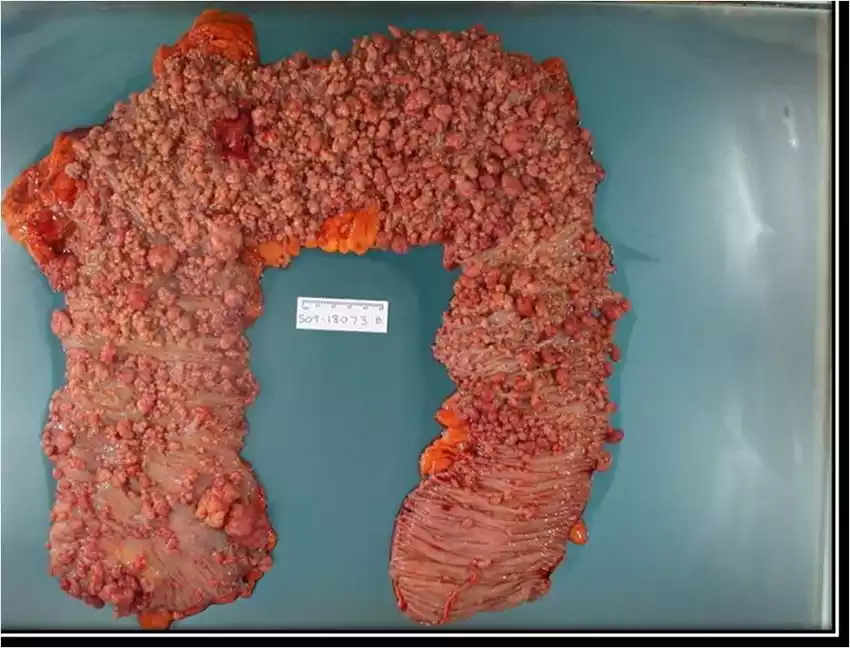Familial Adenomatous Polyposis (FAP) is a rare genetic disorder characterized by the development of numerous colorectal polyps, significantly elevating the risk of colorectal cancer. Gardner Syndrome, a variant of FAP, extends beyond polyps to include extra-colonic features such as soft tissue tumors and osteomas. Both conditions are hereditary, with genetic mutations playing a pivotal role. Understanding these disorders is crucial for early detection, effective management, and improved outcomes for individuals and their families.
Definition of FAP
Familial Adenomatous Polyposis (FAP) is a rare, hereditary genetic disorder characterized by the development of numerous adenomatous polyps in the colon and rectum. FAP is caused by mutations in the APC (adenomatous polyposis coli) gene, which plays a crucial role in regulating cell growth.

Individuals with FAP have a significantly increased risk of developing colorectal cancer, and if left untreated, the condition almost invariably leads to cancer by the age of 40. Due to the high risk, preventive measures such as regular colonoscopies and, in some cases, prophylactic surgery to remove the colon, are often recommended to mitigate the risk of cancer in affected individuals.
Definition of Gardner Syndrome
Gardner syndrome is a subtype of Familial Adenomatous Polyposis (FAP), a rare hereditary condition characterized by the development of numerous adenomatous polyps in the colon and rectum. What distinguishes Gardner syndrome from classic FAP is the presence of extra-colonic features, including benign soft tissue tumors known as desmoid tumors, osteomas (benign bony growths), and epidermoid cysts.

These manifestations can occur in various parts of the body, such as the skin, bones, and abdominal wall. Like FAP, Gardner syndrome is caused by mutations in the APC (adenomatous polyposis coli) gene. The increased risk of colorectal cancer is a significant concern, and individuals with Gardner syndrome often undergo regular surveillance through colonoscopies and may require multidisciplinary management to address the extra-colonic manifestations. Early detection and intervention are crucial in managing the condition and minimizing the risk of complications, including cancer.
Causes and Risk Factors of FAP and Gardner Syndrome
Causes and Risk Factors of Familial Adenomatous Polyposis (FAP):
- Genetic Mutation: FAP is primarily caused by mutations in the APC (adenomatous polyposis coli) gene. This gene normally suppresses the formation of polyps, and mutations lead to the uncontrolled growth of adenomatous polyps in the colon and rectum.
- Hereditary Transmission: FAP is an autosomal dominant disorder, meaning that a person with a mutated APC gene has a 50% chance of passing the condition on to their offspring.
- De Novo Mutations: In some cases, individuals may not have a family history of FAP, and the condition may arise due to de novo (new) mutations in the APC gene.
Risk Factors of FAP:
- Family History: Having a parent with FAP significantly increases the risk of inheriting the condition.
- Unaffected Parents with a New Mutation: Individuals born to parents without FAP can still develop the condition if a new mutation occurs in the APC gene during egg or sperm cell formation.
Causes and Risk Factors of Gardner Syndrome (a subtype of FAP):
- APC Gene Mutation: Similar to FAP, Gardner Syndrome is caused by mutations in the APC gene.
- Hereditary Transmission: Gardner Syndrome follows an autosomal dominant inheritance pattern, and individuals with a mutated APC gene have a 50% chance of passing the condition to their children.
- Genetic Link to Extra-Colonic Features: The specific genetic factors contributing to the extra-colonic manifestations (desmoid tumors, osteomas, and epidermoid cysts) in Gardner Syndrome are not fully understood but are believed to be related to the APC gene mutations.
Risk Factors of Gardner Syndrome:
- Family History: Having a parent with Gardner Syndrome increases the risk of inheriting the condition.
- Unaffected Parents with a New Mutation: Similar to FAP, individuals born to parents without Gardner Syndrome can still develop the condition if a new mutation occurs in the APC gene during egg or sperm cell formation.
Both FAP and Gardner Syndrome are largely determined by genetic factors, and the key risk factor is having a family history of these conditions. Genetic testing and counseling play crucial roles in understanding and managing the risk for individuals with affected family members or those exhibiting symptoms.
Comparison table of FAP and Gardner Syndrome
| Feature | Familial Adenomatous Polyposis (FAP) | Gardner Syndrome |
|---|---|---|
| Primary Characteristics | Numerous adenomatous polyps in the colon and rectum, leading to an increased risk of colorectal cancer. | Similar to FAP but includes extra-colonic features such as desmoid tumors, osteomas, and epidermoid cysts. |
| Genetic Cause | Mutations in the APC (adenomatous polyposis coli) gene. | Mutations in the APC gene, similar to FAP. |
| Colorectal Cancer Risk | Extremely high risk of colorectal cancer if untreated. | High risk, comparable to FAP. |
| Extra-Colonic Manifestations | Limited to adenomatous polyps in the colon and rectum. | Includes desmoid tumors, osteomas, and epidermoid cysts outside the gastrointestinal tract. |
| Osteomas | Not a characteristic feature. | Common in Gardner syndrome. |
| Desmoid Tumors | Uncommon in classic FAP; not a defining feature. | A prominent feature of Gardner syndrome, often requiring separate management. |
| Epidermoid Cysts | Typically not associated with FAP. | Present in Gardner syndrome, contributing to its distinctive features. |
| Other Features | FAP may present with congenital hypertrophy of the retinal pigment epithelium (CHRPE). | Gardner syndrome includes CHRPE as well as the extra-colonic features. |
| Management | Regular colonoscopies, prophylactic surgery, and surveillance for colorectal cancer. | Similar management as FAP, with additional considerations for the extra-colonic manifestations. |
| Implications for Prognosis | Without intervention, FAP leads to colorectal cancer. | Gardner syndrome also poses a risk of colorectal cancer but requires attention to the extra-colonic manifestations. |
While these features generally distinguish FAP from Gardner syndrome, the severity and specific manifestations can vary among individuals. Genetic counseling and personalized management plans are crucial for individuals with either condition.
What are the similarities between FAP and Gardner Syndrome?
- Genetic Cause: Both FAP and Gardner Syndrome are caused by mutations in the APC (adenomatous polyposis coli) gene.
- Colorectal Cancer Risk: Individuals with both conditions face a significantly increased risk of developing colorectal cancer.
- Adenomatous Polyps: Both disorders are characterized by the development of numerous adenomatous polyps in the colon and rectum.
- Hereditary Nature: Both FAP and Gardner Syndrome are hereditary conditions, meaning they can be passed down from one generation to the next.
- Need for Surveillance: Regular surveillance, often through colonoscopies, is essential for early detection and management of the conditions to mitigate the risk of cancer.
- Management Approaches: Management strategies for both conditions may involve a combination of regular monitoring, prophylactic surgery, and other interventions to reduce the risk of colorectal cancer.
While there are similarities, Gardner Syndrome is considered a subtype of FAP and is distinguished by the additional presence of extra-colonic manifestations, such as desmoid tumors, osteomas, and epidermoid cysts.
Diagnosis and Screening
Diagnosis of Familial Adenomatous Polyposis (FAP):
- Clinical Evaluation: A thorough medical and family history is conducted to identify any patterns of FAP or related conditions.
- Genetic Testing: Molecular genetic testing to identify mutations in the APC gene is a key diagnostic tool. Testing may be done on a blood sample.
- Colonoscopy: Regular colonoscopies are performed to visualize and monitor the development of adenomatous polyps in the colon and rectum.
- Biopsy: If polyps are identified during colonoscopy, a biopsy may be performed to confirm the nature of the polyps and assess the risk of malignancy.
- Other Imaging: In some cases, imaging studies such as CT scans or MRI may be used to evaluate the extent of polyp development.
Screening for FAP:
- Genetic Counseling: Individuals with a family history of FAP may undergo genetic counseling to assess the risk and discuss the implications of genetic testing.
- Genetic Testing for At-Risk Relatives: Family members of individuals with FAP may undergo genetic testing to determine if they have inherited the mutated APC gene.
- Regular Colonoscopies: Those with a confirmed diagnosis of FAP or at-risk individuals may undergo regular colonoscopies starting at a young age to monitor and manage the development of adenomatous polyps.
Diagnosis of Gardner Syndrome:
- Clinical Evaluation: A detailed medical and family history is obtained, focusing on the presence of extra-colonic manifestations like desmoid tumors, osteomas, and epidermoid cysts.
- Genetic Testing: Similar to FAP, molecular genetic testing is conducted to identify mutations in the APC gene.
- Colonoscopy: Regular colonoscopies are typically performed to monitor the development of adenomatous polyps in the colon and rectum.
- Imaging Studies: Given the extra-colonic manifestations, additional imaging studies such as CT scans or MRI may be used to assess the presence and extent of desmoid tumors and other features.
Screening for Gardner Syndrome:
- Genetic Counseling: Individuals with a family history of Gardner Syndrome may undergo genetic counseling to assess the risk and discuss the implications of genetic testing.
- Genetic Testing for At-Risk Relatives: Family members may undergo genetic testing to determine if they have inherited the mutated APC gene and are at risk for Gardner Syndrome.
- Regular Comprehensive Surveillance: In addition to regular colonoscopies, individuals with Gardner Syndrome may undergo comprehensive surveillance for extra-colonic features, including imaging studies to detect desmoid tumors, osteomas, and epidermoid cysts.
Early diagnosis and proactive management are crucial for both FAP and Gardner Syndrome to minimize the risk of colorectal cancer and address the extra-colonic manifestations associated with Gardner Syndrome. Regular screenings and monitoring play a key role in the overall management of these conditions.
Treatment Options
Treatment Options for Familial Adenomatous Polyposis (FAP):
- Surveillance and Colonoscopies: Regular colonoscopies are essential to monitor the development of adenomatous polyps. Early detection and removal of polyps can reduce the risk of colorectal cancer.
- Prophylactic Colectomy: In some cases, especially when a large number of polyps are present, or if high-grade dysplasia is detected, surgical removal of the colon (prophylactic colectomy) may be recommended to prevent the development of colorectal cancer.
- Rectal Mucosectomy: In individuals who undergo prophylactic colectomy, a rectal mucosectomy may be performed to reduce the risk of rectal cancer.
- Medications: Nonsteroidal anti-inflammatory drugs (NSAIDs) such as sulindac may be prescribed to help reduce the number and size of polyps, but their long-term use can have side effects.
- Regular Follow-Up: Continuous monitoring and follow-up care are crucial to manage the ongoing risk and address any complications.

Treatment Options for Gardner Syndrome (Including FAP with Extra-Colonic Features):
- Similar to FAP: The treatment options for the colorectal aspect of Gardner Syndrome are similar to those for FAP and may include surveillance, colonoscopies, and prophylactic colectomy.
- Management of Extra-Colonic Manifestations:
- Desmoid Tumors: Treatment may involve surgery, radiation therapy, or medications such as nonsteroidal anti-inflammatory drugs (NSAIDs).
- Osteomas: Surgical removal may be considered for symptomatic osteomas.
- Epidermoid Cysts: Surgical removal may be recommended for symptomatic cysts.
- Comprehensive Surveillance: Regular monitoring for extra-colonic manifestations, including imaging studies and clinical assessments, is crucial to detect and manage these features.
- Genetic Counseling: Individuals with Gardner Syndrome and their families may benefit from genetic counseling to understand the genetic implications and assess the risk for future generations.
- Multidisciplinary Care: Given the variety of manifestations, a multidisciplinary approach involving gastroenterologists, surgeons, genetic counselors, and other specialists is often necessary for comprehensive management.
The choice of treatment depends on the specific features and complications present in each individual. It’s important for individuals with FAP or Gardner Syndrome to work closely with healthcare professionals to develop a personalized management plan based on their unique circumstances and risk factors.
Impact on Families
Impact on Families of Individuals with Familial Adenomatous Polyposis (FAP) and Gardner Syndrome:
- Genetic Concerns:
- Inheritance Anxiety: Families may experience anxiety about the genetic transmission of FAP or Gardner Syndrome to future generations.
- Genetic Testing Decisions: Families may face decisions about whether to undergo genetic testing to identify the presence of the mutated APC gene.
- Emotional Strain:
- Psychological Impact: The constant threat of colorectal cancer and the need for surveillance can create emotional stress and anxiety for both affected individuals and their family members.
- Coping Strategies: Families may need to develop effective coping strategies to manage the emotional challenges associated with the conditions.
- Financial and Practical Considerations:
- Medical Expenses: The cost of regular screenings, surveillance, and potential surgeries can pose financial challenges for families.
- Logistical Concerns: Families may need to navigate logistical considerations related to frequent medical appointments and potential surgeries.
- Quality of Life:
- Impact on Daily Life: The conditions may affect the daily lives of individuals and their families, influencing career choices, educational pursuits, and social activities.
- Impact on Relationships: Families may need to navigate the impact of FAP or Gardner Syndrome on relationships, both within the family and with external support networks.
- Decision-Making Regarding Treatment:
- Treatment Choices: Families may be involved in decisions about treatment options, including the consideration of prophylactic surgeries and their implications.
- Support during Treatment: Providing emotional support during the treatment process is crucial for the affected individual and their family members.
- Role of Genetic Counseling:
- Educational Support: Families benefit from genetic counseling to understand the hereditary nature of the conditions, assess the risk for other family members, and make informed decisions about testing and preventive measures.
- Multigenerational Impact:
- Impact on Children and Siblings: Families may need to consider the implications for children and siblings, who may inherit the mutated gene and require ongoing surveillance.
- Advocacy and Support Groups:
- Connecting with Others: Families may find support through advocacy groups and support networks where they can connect with others facing similar challenges.
- Long-Term Planning:
- Family Planning Decisions: Individuals with FAP or Gardner Syndrome and their families may need to make decisions about family planning, considering the genetic risk and implications for future generations.
Navigating the impact of FAP and Gardner Syndrome on families involves addressing both the medical and emotional aspects of the conditions. Open communication, access to supportive resources, and a collaborative approach with healthcare professionals can contribute to better coping and overall family well-being.
Raising Awareness
- Community Workshops and Seminars: Organize educational workshops and seminars in local communities to provide information about Familial Adenomatous Polyposis (FAP) and Gardner Syndrome. Invite healthcare professionals to share insights on early detection, management, and available resources.
- Online Campaigns and Social Media: Utilize social media platforms to create awareness campaigns, sharing informative content, personal stories, and key facts about FAP and Gardner Syndrome. Engage with relevant hashtags to reach a broader audience and encourage sharing.
- Collaboration with Healthcare Providers: Partner with healthcare providers and organizations to disseminate educational materials to clinics, hospitals, and other healthcare settings. Ensure that information about genetic counseling and testing is readily available.
- Patient Advocacy Groups: Collaborate with patient advocacy groups dedicated to FAP and Gardner Syndrome. Support their initiatives, participate in awareness events, and contribute to the dissemination of accurate information to a wider audience.
- Educational Materials in Public Spaces: Distribute pamphlets, brochures, and posters in public spaces such as libraries, community centers, and schools to increase awareness about the conditions, their symptoms, and the importance of early detection.
- Media Coverage: Seek opportunities for media coverage, including television interviews, radio segments, and articles in newspapers or magazines. Share personal stories of individuals affected by FAP or Gardner Syndrome to humanize the conditions and raise empathy.
- Collaboration with Schools and Universities: Partner with educational institutions to integrate educational sessions about FAP and Gardner Syndrome into school curricula or university health programs. This can help reach a younger demographic and foster awareness from an early age.
- Awareness Events: Organize local awareness events, such as health fairs, where individuals can access information about FAP and Gardner Syndrome, speak with healthcare professionals, and learn about available support services.
- National Health Observance Days: Coordinate efforts to recognize and participate in relevant national health observance days or months related to colorectal health. Use these occasions to amplify awareness campaigns and engage with a broader audience.
- Online Webinars and Podcasts: Host webinars or podcasts featuring experts, healthcare professionals, and individuals with lived experiences. These platforms provide accessible and interactive ways to disseminate information and answer questions from the audience.
- Participation in Advocacy Initiatives: Join larger advocacy initiatives focused on colorectal health and genetic disorders. By aligning efforts with broader campaigns, you can contribute to a collective voice for awareness and policy change.
Summary
Familial Adenomatous Polyposis (FAP) and Gardner Syndrome present complex challenges beyond their physical manifestations, impacting emotional well-being, relationships, and life planning. Beyond medical management, addressing the emotional toll, fostering support networks, and raising awareness are crucial for enhancing the quality of life for affected individuals and their families. A holistic approach that considers both the physical and psychosocial aspects is essential in navigating the multifaceted implications of these hereditary conditions.


